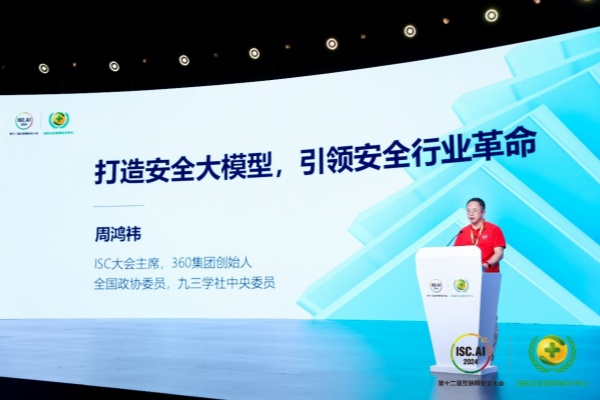
- Home
- Media Center
- Events
- Membership
- Digital Academy
-
Reports
- Collection of cases on Jointly Building a Community with a Shared Future in Cyberspace
- Collection of Shortlisted Achievements of World Internet Conference Awards for Pioneering Science and Technology
- Reports on Cross — Border Ecommerce
- Reports on Artificial Intelligence
- Reports on Data
- Series on Sovereignty in Cyberspace Theory and Practice
- Other Achievements
- About WIC
- 中文 | EN

360 Group invests in cybersecurity large models

Zhou Hongyi, founder and chairman of Chinese internet enterprise 360 Security Group. [Photo provided to chinadaily.com.cn]
Artificial intelligence must be leveraged to counter the ever evolving landscape of AI-enhanced cyberthreats, as traditional security approaches are inadequate against such challenges due to AI's superior intelligence, said Zhou Hongyi, founder and chairman of Chinese internet enterprise 360 Security Group.
In an interview in Beijing on Wednesday, Zhou identified two major challenges posed by AI in cybersecurity. He highlighted the inherent security risks of AI large language models and the potential misuse of AI by malicious actors to develop attack software and phishing websites.
Precedents for AI-assisted crime already exist. In February, Hong Kong police revealed a fraud case where individuals used AI deepfake technology. The perpetrators impersonated a multinational company's CFO during a video conference, convincing a Hong Kong-based employee to transfer HK$200 million. The fraud was only uncovered when the employee verified the request with the headquarters.
Zhou believes that AI can address several pain points in the cybersecurity industry, including the difficulty of analyzing vast amounts of data, rapid incident response, traceability and the shortage of security experts. With the advent of large models, these challenges can be mitigated.
To develop a robust security large language model, 360 has invested tremendous resources into the sector, Zhou added.
He explained that the 360 Security Model comprises six sub-models targeting areas such as attack detection, operational management, traceability, knowledge management, data protection, and code security and vulnerability analysis.
On Wednesday, Zhou also announced at a cybersecurity conference in Beijing that the 360 Security Model would be made available for free to customers who purchase standard 360 products. Existing customers will receive a free upgrade to include the security model.

The World Internet Conference (WIC) was established as an international organization on July 12, 2022, headquartered in Beijing, China. It was jointly initiated by Global System for Mobile Communication Association (GSMA), National Computer Network Emergency Response Technical Team/Coordination Center of China (CNCERT), China Internet Network Information Center (CNNIC), Alibaba Group, Tencent, and Zhijiang Lab.





